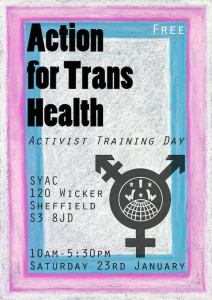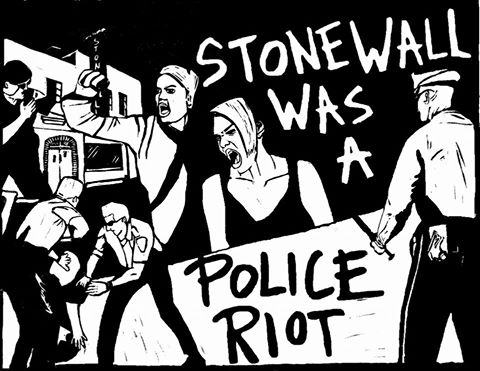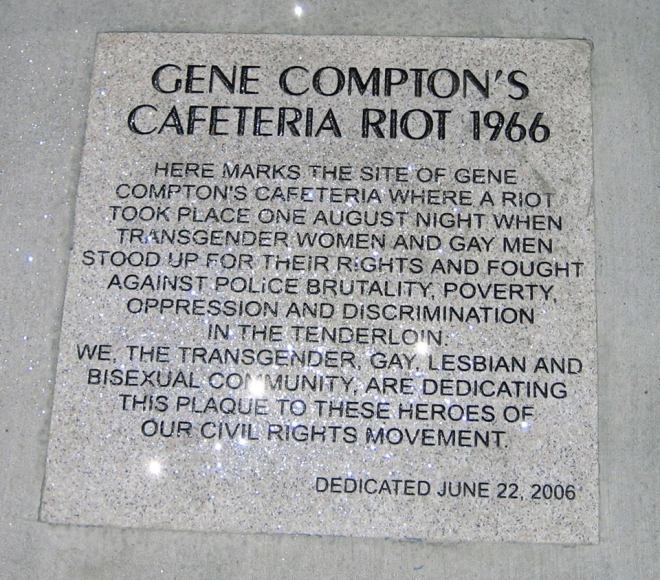
QASh members attended an activist training day put on by IWW and Action for Trans Health on January 23rd, organised by Pazuzu Gaylord and Jess Bradley. The meeting was open to anyone but due to high levels of interest trans people were prioritised, welcoming mostly locals but some ATH comrades were from elsewhere in the country.
We started the day off with a discussion of what made a good campaign, brainstorming a few ideas as a group, here’s what we came up with:
- good propaganda
- lasting impact and effectiveness
- enjoyability
- specific and focused aims
- achievable goals
- accessible on different levels (eg. media campaigns as some aren’t able to take part on physical protests or other direct action)
- making connections and building solidarity with others
- disrupting shit things
- ability to speak upwards to decision makers but also to empower us
- policy + social change
- to have activists who are knowledgeable on the hows and whys of our campaign
- flexibility to adapt to criticism
After a break we went on to talk about issues that affected our local trans communities including but not limited to: trans exclusive night-life, long GIC waiting lists, little to no free community spaces, gendered toilets and rape crisis centers, the bureaucracy of name changing at uni and actively transphobic GPs.
From that we talked about solidarity and multiple issue campaigns and the various effectiveness of them, a discussion sparked about what we all understood inclusivity in our activism / campaigns to mean. Almost unanimously we came to conclusion that trans liberation activism should always be led by and in the hands of trans people, with the role of cis people to be to listen, support and advocate. On this it was noted we needed to be continuously welcoming of questioning people and avoid the policing “not trans enough” attitudes that some fall into. We agreed we need to be aware of the different intersections people may face along with being trans, and how we can be more accommodating and supportive to those people. It was also clear that our activism would need to be vehemently anti-capitalist, non-hierarchical and intersectional.
With that and general campaigning ideas in mind, we had guest speech from QASh and IWW member Keira James to talk about her successful campaign last year to get her job back, when she was unfairly dismissed from her job due to her workplace’s transphobic attitudes about which toilet they were allowed to use. Keira emphasised the importance of knowing one’s legal rights (ie. it’s not illegal to use whichever toilet you want), the effectiveness of IWW’s ‘march on the boss’ technique and making companies look silly. From this we took away a general method we could use for future campaigns.
Decide demands > deliver demands > if denied escalate to action eg. picket line > tell media > repeat as necessary kicking up more of a storm each time until demands are met.
After a lunch supplied by IWW (tofu and noodles!), we went on to specific campaign planning in smaller groups, focusing on a point from our earlier list of “shitty local issues” list. [for obvious reasons we have decided to not to publicise our future campaign ideas online, but they are very promising :)]
Then Jess Bradley went on to give their train the trainers session, she went over how she teaches sexual health professionals about how to be more inclusive of trans people in their practice. She usually goes over the trans 101 with them, and then goes on to different scenarios and lets them talk about what they would do, making sure they’re learning how to correctly accommodate for trans people, not make assumptions about people’s body parts and not to misgender people. As a group we went over some of these scenarios ourselves and made sure we would know the correct way health professionals should act, and discussed how we would make sure we could give this training to others successfully. This was very useful and well received, it’s really encouraging to know that with Jess’ help we are able to inform doctors and other health professionals the right practice when it comes to treating trans patients, improving the well-being and treatment of trans people in the NHS.
The day was overall a great success, with great connections made, promising campaigns ideas and very insightful talks and training from Keira James and Jess Bradley. With enough interest to definitely point towards facilitating another larger meeting it seems like something which will likely be put on again later in the year. Queer Agenda Sheffield are very proud to be able to be affiliated with Action for Trans Health and look forward to working with them in the future.
Ashleigh x
If you are interested in more training around trans health and advocacy come along to their next training day, 13th of February at the LGBT Foundation, Manchester for more info check out the facebook event page.
To learn more about Action for Trans Health check out their site here!
 If Twitter existed in the 1960’s #QueerLivesMatter would have been trending; anyone who was of a minority or non conforming gender or sexuality was routinely harassed, intimidated and beaten by police. On one August night in 1966 at Compton’s Cafeteria, when the police attempted their latest arrest of a trans woman, she threw her coffee in his face, enough was enough, the fight back had begun. This was the start of the first of many riots against the routine police violence against queer people, the most famous of which being the 1969 Stonewall riots in New York city.
If Twitter existed in the 1960’s #QueerLivesMatter would have been trending; anyone who was of a minority or non conforming gender or sexuality was routinely harassed, intimidated and beaten by police. On one August night in 1966 at Compton’s Cafeteria, when the police attempted their latest arrest of a trans woman, she threw her coffee in his face, enough was enough, the fight back had begun. This was the start of the first of many riots against the routine police violence against queer people, the most famous of which being the 1969 Stonewall riots in New York city.


